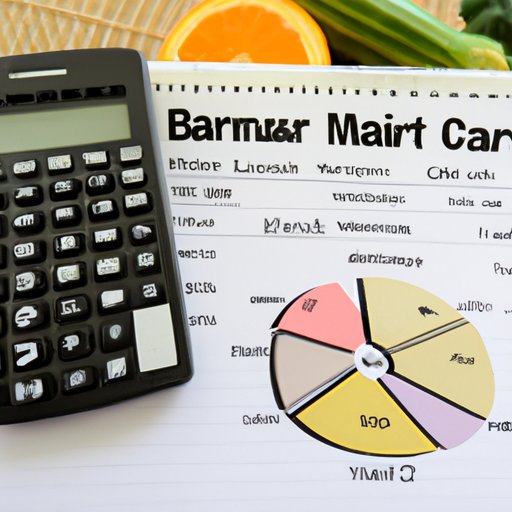Introduction
Maintaining a healthy weight is important for maintaining overall health. One of the most effective ways to do this is by monitoring your calorie intake. But how many calories should you eat to maintain your weight? In this article, we will explore the different methods for calculating your caloric needs and provide tips for staying at a healthy weight.
Calculate Your Calorie Needs to Maintain Weight
To determine how many calories you need to maintain your weight, you must first estimate your Basal Metabolic Rate (BMR). This is the amount of energy your body needs to function when at rest, and it accounts for about 60-75% of the calories you burn daily. To calculate your BMR, you can use the Harris-Benedict Formula:
For men: BMR = 66 + (6.2 x weight in pounds) + (12.7 x height in inches) – (6.76 x age in years)
For women: BMR = 655 + (4.35 x weight in pounds) + (4.7 x height in inches) – (4.7 x age in years)
You can also use an online calculator to estimate your BMR. Once you have calculated your BMR, you can then determine your ideal calorie intake for weight maintenance.
How Many Calories Should You Eat a Day to Maintain Your Weight?
The amount of calories you need to maintain your weight depends on several factors, including your activity level. The more active you are, the more calories you will need to consume. According to the American Council on Exercise, a sedentary adult needs approximately 12 calories per pound of body weight to maintain their weight. An active adult, however, needs between 14 and 17 calories per pound of body weight. Therefore, a person weighing 150 pounds who is moderately active would need around 2,550 calories per day to maintain their weight.

Eating Right for Weight Maintenance
Once you have determined your ideal calorie intake to maintain your weight, it’s important to select nutrient-dense foods that will provide your body with the vitamins and minerals it needs. Eating a balanced diet consisting of fruits, vegetables, lean proteins, healthy fats, and whole grains is key to maintaining a healthy weight. It’s also important to monitor your food intake and adjust your calorie intake as needed.

A Guide to Healthy Weight Maintenance with Calorie Counting
Calorie counting can be an effective tool for maintaining a healthy weight, but it’s important to set realistic goals. Start by educating yourself about nutrition and making small changes to your diet, such as eating smaller meals throughout the day and prioritizing healthy snacks. Additionally, incorporate exercise into your routine and stay mindful of portion sizes.

How to Estimate Your Caloric Intake for Weight Maintenance
To estimate your caloric intake for weight maintenance, you must first calculate your Basal Metabolic Rate (BMR). This is the amount of energy your body needs to function when at rest. To calculate your BMR, you can use the Harris-Benedict Formula or an online calculator. Once you have calculated your BMR, you can then determine your ideal calorie intake for weight maintenance based on your activity level.
Tips for Staying at a Healthy Weight by Monitoring Calorie Intake
In order to successfully maintain a healthy weight, it’s important to create a daily calorie budget and track your calorie intake. Eat smaller meals throughout the day and prioritize healthy snacks, such as fruits and vegetables. Incorporate exercise into your routine and stay mindful of portion sizes. Finally, make sure to adjust your calorie intake as needed.
Conclusion
Calorie counting is an effective tool for maintaining a healthy weight. By calculating your Basal Metabolic Rate (BMR) and determining your ideal calorie intake for weight maintenance, you can create a daily calorie budget and track your calorie intake. Eating nutrient-dense foods and staying mindful of portion sizes are key to maintaining a healthy weight. Remember to set realistic goals, educate yourself about nutrition, and make small changes to your diet. With these steps, you can successfully maintain a healthy weight.
(Note: Is this article not meeting your expectations? Do you have knowledge or insights to share? Unlock new opportunities and expand your reach by joining our authors team. Click Registration to join us and share your expertise with our readers.)
